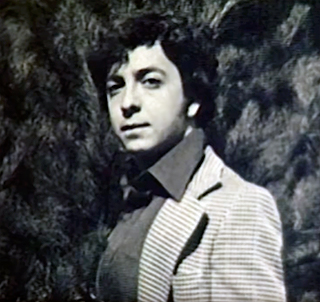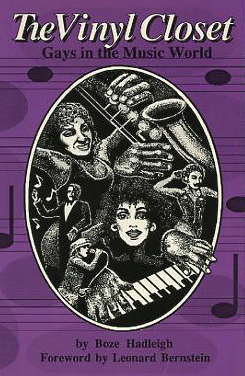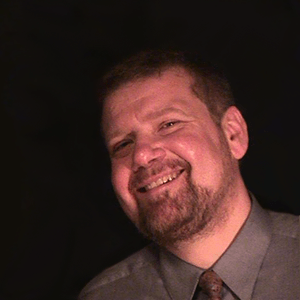© 1991 Rich Grzesiak, all rights reserved.

"Outing" and Hollywood: Boze Hadleigh Trumpets Hispanic Hollywood and The Vinyl Closet
Boze Hadleigh easily slips into the mode of autobiography: "Remember George is my real name," he confides, "Hadley is my English surname. Garcia is my grandmother's name. I speak Spanish fluently and I translated Hispanic Hollywood into Spanish. My B.A. is in Spanish literature and my master is in journalism. This is the first book on this subject for a mass audience."
George Hadley-Garcia (known better to gay readers as by the pen name of "Boze Hadleigh") created quite a stir four years ago with his phenomenal book of celebrity interviews with major, albeit deceased gay film luminaries - his Conversations with My Elders picked the brains of the late Rock Hudson, George Cukor, Sal Mineo and the like on their gay experiences in the film capital. The reaction from readers was just this side of ecstatic, and a sequel has long been in the works.

He is understandably proud to have two books currently published: Hispanic Hollywood [Citadel Press; $15.95/softcover], which is the first in-depth look at that community's contributions to the film industry and is simultaneously being released in Spanish, and The Vinyl Closet [Los Hombres Press; $9.95/paperback, due out in May], which does for the world of gay singers and dancers what its namesake (Vito Russo's The Celluloid Closet) did for gays in film.
Talking to this guy is like having your own portable Halliswell guide to the cinema, only in a much more accessible, charming, and homophilic form. He genuinely cares about the struggles which minority artists confront in an increasingly orthodox, mainstream culture, and his journalism avidly tackles those topics in a no nonsense, "I'd-like-to-break-down-these-barriers" manner. Will he be our next Vito Russo? George Hadley-Garcia affects disinterest: "Vito was a lecturer, while I'm a writer. And after all I've written on these subjects, I doubt I'll have much more to add."
He certainly - and to my great delight - was at no loss of words around me. I kicked off our tete-a-tete with a fascination mixed with admiration:
Rich Grzesiak (RG): Why is ethnicity so passé today in the cinema?
Boze Hadleigh (BH): Citadel Press did a book entitled Black Hollywood in 1975, and it took them 16 years to do a book on Hispanic Hollywood. Hispanics are now a bigger minority than black Americans; it's the biggest minority in America other than men.
You will notice Dolores Del Rio's foreward written in 1983 - she was bisexual - it has been variously reported she had affairs with Marlene Dietrich and Anna May Wong.
My original conception was to do a book on Hispanic stars like her, Roman Navarro and Cesar Romero. But Citadel Press wanted an overview from the silent era on. We included the people who were Hispanic who very often did not play Hispanic roles, and also focused on Hispanic themed films which, like gay themed ones, are usually portrayed by non-Hispanics like Paul Newman and Donna Reed.
Today in Hollywood, if you have a gay role, I have been told repeatedly they try to cast it with a straight actor or actress so when it comes time to be interviewed by People magazine one can comment, "Oh it was a real stretch for my acting talents - my husband or wife as the case may be was totally supportive - I thought of my girl friend during the love scenes" et cetera.
It still occurs today. The plum roles still do not go to Hispanic performers. Remember the movie Havana with Robert Redford, which was a big flop? The female leading role of the Hispanic character was portrayed by a Swedish actress even though there were four big name Hispanic actresses in Hollywood who were dying to play it. So you have a WASP actor in the leading role, and a marketing strategy that targets everybody, even though Hispanics are a huge minority.
RG: You bring up an interesting point when you mention Del Rio's bisexuality: Marlene Dietrich is a living person who could conceivably bring libel action over accusations of bisexual liaisons. Do you understand the seriousness of such assertions?
BH: But Dietrich's bisexual nature is widely known; it's been referred to in at least 5 or 6 books.
Now when Garbo was alive they didn't dare to [make assertions about her sexual orientation]. I don't know what's the distinction. Garbo was more lesbian, if anything; Dietrich is bisexual, she is not lesbian. But it has been printed in every single reference from Hollywood Babylon to various Dietrich biographies. You name the man or woman in Hollywood who was attractive - she [D.] had affairs with them.
RG: But ethnicity remains no big thing in Hollywood today - actioners, thrillers, gore epics, that's what's hot. Could a movie with an obviously Hispanic theme like Juarez be made today?
BH: No, it's less likely to be filmed today than when it was made in 1939 - they want everything white bread. The reason is demographics, as they want to reach the widest possible audience because movies are so expensive to make. It's much more likely a TV movie would be made with a Hispanic theme.
The actor Edward James Olmos (of TV's Miami Vice fame) claims Hispanics drink twice as much beer and attend movies five times as often as their Anglo counterparts. Hollywood's main concern has always been profits and not reflecting what's out there.
RG: I noticed in a recent TV Guide a listing for a new Richard Chamberlain TV movie.
BH: He did come out in France although his publicist denied it. She retracted it; he never did, you see, he became unavailable for comment. She, who is from Denmark and should know better, just went on and on about what a terrible thing to say.
RG: So what's the big deal in this day and age? Certainly a Hispanic performer doesn't need to hide his Hispanicity. A gay actor has to play out the Liberace strategy or denies all and gets married?
BH: Even Liberace was yanked out of the closet posthumously. Everything TV sells today has to do with heterosexuality. Half the time, the commercials sell not just the product but the heterosexual lifestyle. Whenever a plot involves someone who's not a septuagenarian, it inevitably involves a romance, sexual tryst, or straight relationship. And when they do present a gay person, he's the only person in town. They never want to show the personal life of a gay person when they present the gay character.
These represent not just economic but propagandistic choices. Most of the people working in Hollywood who are gay are closeted, and they align themselves with the agenda of promoting heterosexuality. If you have a teenage male appear in an ad, sitcom, or movie, he has to have a girlfriend. It's important in story conferences to mandate early on in the plot that X is pining for Susie or dating Mary.
On TV's Doogie Howser, M.D., the hero's always involved with women. Straights comprise 90% of the population, but they want to exercise 100% of the influence on our lifestyle. They hardly admit anything else exists.
RG: The politically correct phrase we're celebrating here is the heterosexist bias of the majority culture.
BH: Christopher Isherwood put it in a way that couldn't be surpassed: "the heterosexual dictatorship."
Black intellectuals deride the use of so-called "black-ploitation" flix like Shaft. Could LaBamba be perceived as a Hispanic exploitation picture and if so, why haven't Hispanics objected to it?
It really wasn't an exploitation film because it honored a Hispanic kid who made good. It was the success of The Buddy Holly Story that made LaBamba possible just as the success of Saturday Night Fever paved the way for Salsa.
I have not seen Silence of the Lambs but some movie critics claim that unless you're attuned to it you won't discover that the villain is gay. Some gays are upset with it as they fear the impression of gays presented to folks out in the sticks.
RG: So why aren't there Hispanic exploitation flix to mirror the financial success of movies like Shaft?
BH: Well, black exploitation films are a thing of the past, as you have black themed movies being presented made by blacks. Movies like Shaft were made by white people - and that's the difference.
The movie Old Gringo didn't do well at the box office, but in making it Jane Fonda insisted on bring in Hispanic artists, including the director, who would present Hispanics as equals to their counterparts. But no one went to see this film, including Hispanic audiences. If it's a film set in the past, it doesn't tend to sell.
RG: How would Hispanic audiences react to Hispanic gay material?
BH: They'd respond the same as straight ones - in general, they wouldn't go for it. Remember that Hispanic culture is more homophobic than the WASP one because macho is more ingrained.
In attempting to interview Hispanic gays for Hispanic Hollywood, they usually were married with children whereas nowadays many gay actors under forty years of age neither marry nor have children.
In Hispanic culture, if you're gay you must keep it a secret your entire life. The top box office Latin-American star ever had to marry an older Russian woman to preserve his reputation in Mexico. If he had persisted in not marrying, in Mexico that would have been perceived as freakish. By contrast, staying unmarried has never hurt Clifton Webb, Richard Chamberlain, Warren Beatty or other Anglo actors.
RG: In general, Hispanic Hollywood offers an upbeat look at progress made to better serve that subculture. Do you think gays will also be able to emulate that success?
BH: Hispanic characters have been on the screen since silent days when all their appearances were negative. Over 70 years things have progressed such that if there is a major Hispanic character in a film, the producer will take pains to ensure that he or she won't be gratuitously offensive to Hispanics.
By contrast, gay characters did not appear on American screens in a major way until 1959. Gays represent, however, the one last group that it's OK to offend.
RG: Is the fear closeted gay actors have of playing gay characters one of being stereotyped for future roles?
BH: It's not that so much as the fear of being "out"-ed, of someone saying, "He played a gay character. Isn't he gay himself?" If the gay actor is married and has children, there'll be less fear involved.
Straights are really dense about this whole issue. If someone was married for no matter how brief a period, and/or if they have a kid, they'll say, "Oh, he can't be gay 'cause he's married" or had a kid.
Of course we know that means nothing, especially with older men.
A lot more people are willing to play a gay character than ever before as half the time they are nominated for an Oscar, Emmy or Tony. Frequently they're patted on the back with the line,"How brave of you!"
RG: Why is your new book, The Vinyl Closet, coming from a small press?
BH: Time and again I've been told music books don't do well sales wise - that's why major publishers passed on it. It's the first book on gays in musc and I mention hundreds of names of people living and deceased. It gives you an excellent overview, especially of British singers - it's amazing how many Britons have come out of the closet. There's even a chapter on dance. The book demonstrates how many more people who work in the music profession are out - as opposed to Hollywood, where virtually no major star is.
Until the advent of music videos, you tended not see the musicians involved. Whereas actors are seen, singers are usually heard.
RG: Vito Russo has left us and for many people he was the polemicist in lecturing about movies. He even wrote a preface for The Vinyl Closet.
BH: He was most kind to me. The Vinyl Closet picks up where The Celluloid Closet left off. Films and music are the twin worlds of entertainment
The book also bears a foreward by the late Leonard Bernstein. It's sad this book will appear after both have died. I'd hoped it would have appeared while they were still alive.
RG: It seems there is so much death once has to wait for in order to tell the truth about being a gay star in Hollywood.
BH: It can now be told that the late Jack Benny was secretly gay, since most of those he was intimate with have died.
In the sequel to Conversations with My Elders, I have an interview with an elderly, extremely well respected English actor, but that cannot appear until after he's gone. I have a long chapter on Paul Lynde, and there was so little published about his life ["confirmed bachelor"] as opposed to his career when he was alive. Everyone who was gay in Hollywood knew that he was. He discussed just about every gay comedic actor with me from Franklin Pangborn to the late seventies.
When BillyDeWolfe were alive, in that naive time, he actually got away with appearing in drag on stage. Gays have come a long way - but we have a longer road ahead of us.
Rich Grzesiak has been nominated for several Gay and Lesbian Press Association awards. His editing for Philadelphia Gay News won G.L.P.A.'s 1986 Wallace Hamilton Award for cultural reporting. He has written for Edge since January of 1988 and passionately loves California.
